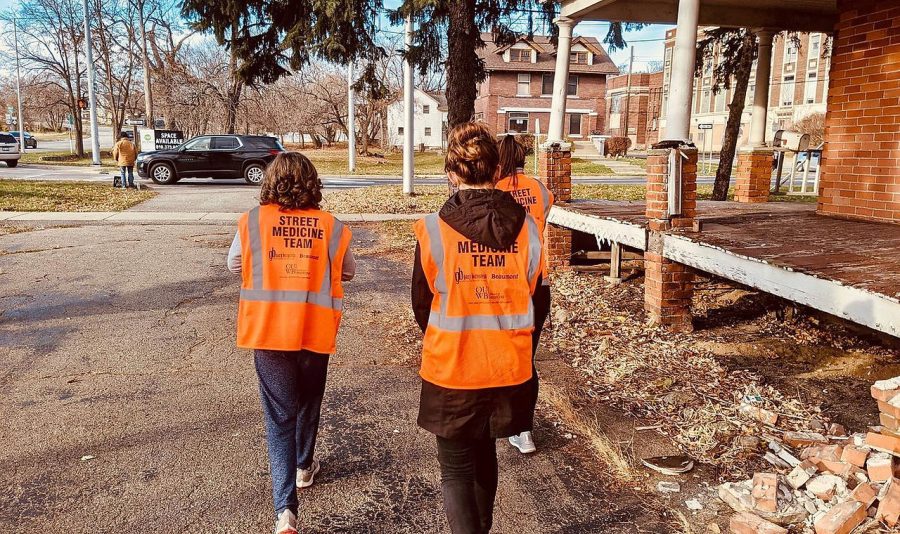OUWB’s Street Medicine Oakland supports Pontiac community through winter clothing drive
Photo courtesy of streetmedicineoakland.org
Street Medicine Oakland looks to bridge the gap between the homeless community and healthcare providers.
Thanks to the leadership of Street Medicine Oakland (SMO) at the Oakland University William Beaumont School of Medicine (OUWB), this winter season in Pontiac is looking warmer than before.
Pontiac is ranked fifth in Michigan for the largest homeless population, and oftentimes, these homeless people do not have access to appropriate medical care. SMO targets this population to help provide quality medical care, and recently organized its second winter clothing drive for their warmer winter.
“When the weather gets cold, it’s really important for people to be able to have supplies like winter clothing, sleeping bags, and blankets,” Kaitlin Pataroque, the chair of the street runs projects, said. “It can be life-saving.”
According to Pataroque, the clothing drive was successful as SMO collected a total of 70 shirts and coats, 25 pairs of pants and 15 pairs of shoes as well as socks, hats and gloves.
“It felt really encouraging that so many people were willing to donate their belongings,” Pataroque said. “It was wonderful to help give dignity to the city and its residents so that people could take pride in where they live. During this period, I was also connected with other individuals who do similar work, and was able to call them to hear how their outreaches work.”
As a collaborative effort between OUWB, Beaumont Health and the Gary Burnstein Community Health Clinic, SMO has received various support for its outreach projects. Projects for Assistance in Transition from Homelessness (PATH) is one of the first contributors to the launching of the program.
“I went with them on their route back in Spring of 2020,” Pataroque said. “We then had an initial route, and then would ask homeless individuals that we met, ‘Do you know of anyone else who might need some help?’ And we would add and modify our route that way. It’s been very successful.”
Gary Burnstein Community Clinic provides a place to store supplies and an opportunity for uninsured patients to see healthcare professionals. The Oakland Country Health Department has also been a big part of the outreach projects during the COVID-19 pandemic by COVID-testing residents at Hope Shelter regularly, getting vaccines to people on the street and coordinating the delivery of medications for people with COVID-19 who qualify for emergency use authorization of monoclonal antibody or antiviral treatments.
Community service led by SMO also includes the members and Beaumont physician meet homeless individuals directly on the streets of Pontiac to provide lunch, supplies and immediate medical care every other Saturday. Every other Friday, they meet guests staying at Hope shelter to provide necessary medical care and health counseling.
They also held Pontiac Community Clean-Ups where medical students, faculty members and their families volunteered to help spruce up the city of Pontiac primarily with park beautification such as spreading mulch, pulling weeds and trash pick-up.
“We are a pretty young program, but have fortunately become very successful,” Pataroque said. “We’ve been able to give advice to other students trying to start similar programs, and also have been able to redirect outside groups to other OUWB initiatives. For example, connecting clinics for refugees to the Asylum Initiative Group at OUWB. We have done some street outreaches in Royal Oak. But for now, we are focusing on growing our presence in Pontiac and hoping to start health fairs there.”
As an aspiring primary care physician, Pataroque emphasized important qualities to develop: being humble and resourceful as well as being able to understand the barriers the patients face.
“These are traits that are helpful for everyone to have, but have really helped guide me as I have continued in my medical training,” she said. “I won’t always know the answers to an issue, so knowing that I can reach out to others is an important quality and also something very reassuring. It’s important for me to know my own limitations, and to be comfortable asking people in my community for help.”
SMO continues to better understand patients’ realities in order to provide quality medical care and resources while also equipping future physicians and healthcare leaders with perspective and experience caring for the homeless population, as part of its mission to “bridge the gap between the homeless members of our community and healthcare providers.”






